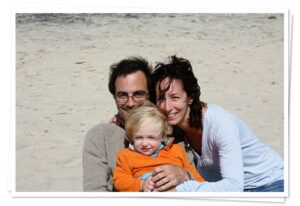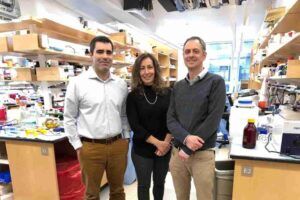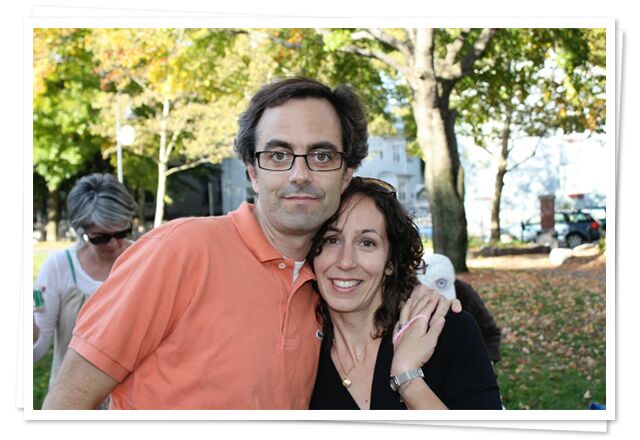This reflection was written by Kristen Palma, President, TargetCancer Foundation
 In 2007, I was in love and married to an incredibly smart and loving partner. We had a beautiful baby boy who had just turned one, and we were living in a moment of possibilities and plans for the future as a new family.
In 2007, I was in love and married to an incredibly smart and loving partner. We had a beautiful baby boy who had just turned one, and we were living in a moment of possibilities and plans for the future as a new family.
Paul ran marathons, biked everywhere, went to yoga, was a fabulous cook, ate healthy, and had no family history of cancer. When he started to have pain on his right side, it barely registered on my radar. When it became more acute, Paul saw a doctor who immediately sent him for a CT scan. As someone who comes from a long line of worriers, I never worried about Paul. But then something was found on the scan.
I can only describe life after this as an avalanche – completely out of our control with bad news coming at us faster and faster. In the 21 months until his death, we never felt a reprieve where we could come up for air or saw any light. We learned Paul had cholangiocarcinoma, a rare cancer of the bile ducts that we were told normally affected people over 70 and had no treatment protocol. It also had a five-year survival rate of only 20%. For me, the day we received his diagnosis was worse than the day he died. We both knew that the words we heard had just irrevocably altered our lives, our son’s life, and the lives of everyone who loved Paul.
We knew nothing about cholangiocarcinoma or what it meant to have a rare cancer, but I can still hear our oncologist tactlessly telling us that “No one is working on this cancer because no one gets it, and pharma and researchers don’t care about it.”
While my reaction was despair, Paul’s was action. To him, it was unacceptable. We were at Massachusetts General Hospital (MGH), one of the best hospitals in the world. And we were in Boston, surrounded by the nation’s top scientists. Yet we were told that no one was doing anything. No one cared, simply because this cancer was rare. It was an impossible situation.
In the midst of grueling treatments that were meant for patients with pancreatic cancer — treatments justified only on the grounds that the pancreas was in the same general location as the bile ducts, but not informed by any molecular science — Paul became determined to find better solutions. He decided to start a non-profit, and TargetCancer Foundation was born.
Somehow, Paul had an innate understanding of something none of us had ever heard of, molecular therapeutics and precision medicine. He felt there could be a drug sitting on a shelf somewhere that could help him, if only the tools existed to test it on his cancer.
He learned about cell lines and met with Dr. Jeff Settleman, then the Director of the Center for Molecular Therapeutics at MGH. Paul quickly decided to start raising money to support Dr. Settleman’s work on cell lines and awarded the first grant of $7,500 from his chair while receiving a chemo treatment in May 2009.
“Now, the problem with my cancer (one of the problems) is that it is so uncommon. I was told at my diagnosis that I had a cancer that almost “no one gets” and certainly “nobody under 40.”
Consequently, it receives very little research attention or dollars. Yet there is a fund established for it at MGH and indeed MGH has a doctor devoted to developing protocols for treatment. I want to help fund that research. And when I get better, I want to direct funds to other cancer research that explores other less popular cancers.
I visited with the head of the molecular research department today at MGH to see if the lab would be an appropriate place to donate TargetCancer funds. I am feeling very comfortable that it is. At the lab, more cancer cell lines are maintained and grown than in any other lab in the world. Molecular research is where the breakthroughs will come. Not likely to be “Eureka” moments, but a slow and deliberate process.”
Paul died three months later at age 39.
After his death, my brother and I decided to keep the foundation going to continue the work Paul had started. We did not know exactly what we were embarking on but were lucky enough to be connected to key people early on to give us direction.
 It was Dr. Settleman who connected us to Dr. Nabeel Bardeesy, a scientist who had previously focused on pancreatic cancer at the MGH Cancer Center. Dr. Bardeesy was a young rising star and was willing to meet with us and take a risk early in his career to focus on this understudied cancer. From the moment we all met in 2010, there was a feeling of trust and possibility. Nabeel had a very clear sense of what was needed to make an impact on this cancer.
It was Dr. Settleman who connected us to Dr. Nabeel Bardeesy, a scientist who had previously focused on pancreatic cancer at the MGH Cancer Center. Dr. Bardeesy was a young rising star and was willing to meet with us and take a risk early in his career to focus on this understudied cancer. From the moment we all met in 2010, there was a feeling of trust and possibility. Nabeel had a very clear sense of what was needed to make an impact on this cancer.
Basic tools like mouse models and cell lines had to be created specifically for cholangiocarcinoma. They were essential to understand the biology of the disease and to inform what treatments could be effective. Nabeel had started initial work, but there were no existing cell lines or research tools, and only two NIH grants focusing on the disease. Without data, Nabeel could not apply for federal funding.
This is where TargetCancer Foundation was able to help. To many, our initial grants of $50,000 may seem negligible. But, for Dr. Bardeesy’s lab, they were enough to create the research tools needed to generate the data that made him eligible to apply for those larger federal grants.
As time went on, we met regularly with Nabeel and his lab to learn about their progress, and we made a decision to do something unusual for foundations. Rather than look for new researchers each year, we decided to continue funding his lab and invest in him and his work. We believed in his process, and from that place of trust grew a true partnership and friendship.
Over the years, the Bardeesy Lab developed mouse models and cholangiocarcinoma cell lines that were critical in identifying two genomic mutations that are present in a large percentage of cholangiocarcinoma patients. In 2012, the Bardeesy lab created the first Cholangiocarcioma Cell Line Bank.
Based on the knowledge gained from these research tools, there are now two FDA-approved drugs available to cholangiocarcinoma patients with these mutations.
I cannot stress enough what this means to write this.
Watching Paul suffer through treatment after treatment of harsh chemotherapy drugs that were not meant for his cancer and had little chance of being effective was devastating. Today, while still an incredibly difficult disease to treat, cholangiocarcinoma patients now have options that are meant for them. Many are living longer with a better quality of life.
While not a cure, these treatment options mean everything to patients and families. They mean memories of one more birthday, one more holiday, a graduation, a wedding. It would have meant that our son had his own memories of his father instead of only the stories he has grown up hearing from others.
Over fifteen years, TargetCancer Foundation has awarded more than $1 million to the Bardeesy Lab. This investment has been meaningful to us and to Nabeel in many ways. But now I am tremendously proud to say that we have reached Paul’s original goal when starting TargetCancer Foundation.
After 15 years, dedication and work, Dr. Bardeesy has completed his work and has launched the Cholangiocarcinoma Cell Line Atlas, and a full repository of cholangiocarcinoma cell lines that will be released into the public domain for scientists throughout the world to conduct cholangiocarcinoma research.
In the worst and weakest moments of his life, Paul was filled with strength and excitement at the possibilities this work could bring for him and other rare cancer patients. Having seen other loved ones face more common cancers and experience the life-saving benefits of research, I know too well that investment in research cannot be interrupted for any reason.
We are so grateful for the partnership and true friendship that evolved from the investment we made with Dr. Bardeesy and his lab. It may not be common, but it is possible, and has made a lasting impact that is true to who Paul was. Someone who looked for answers and solutions, lived life with strength, and, above all, valued the possibilities that came from the relationships he devoted so much of his life to.
It is the greatest honor to know that each new discovery in cholangiocarcinoma will be touched by his legacy.
Read more about the Cell Line Atlas
- A Promise Fulfilled: 15 Years After Paul Poth’s Vision, a New Era in Cholangiocarcinoma Research Begins (TargetCancer Foundation)
- Generation of a Biliary Tract Cancer Cell Line Atlas Identifies Molecular Subtypes and Therapeutic Targets (AACR: Cancer Discovery)
- Scientists Build Cell Line Atlas of Deadly Cancers of the Bile Ducts and Gallbladder (Broad Institute)
- Research Spotlight: ‘Cell Line Atlas’ Provides a Crucial Resource for Developing Therapies for Biliary Tract Cancer (Mass General Brigham)
